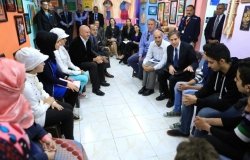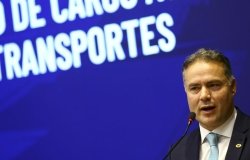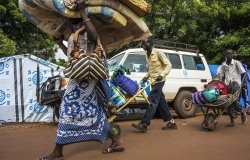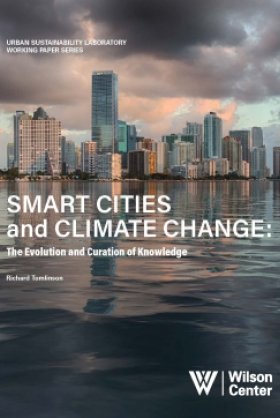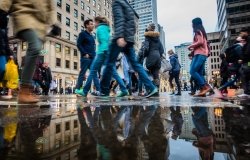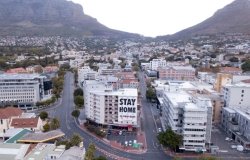Combating Sex Trafficking by Eliminating the Demand
On May 12, in the inaugural event for a new collaboration between the Woodrow Wilson Center and the Hunt Alternatives Fund on the demand dynamics of sex trafficking, Ambassador Swanee Hunt moderated a panel discussion, "Combating Sex Trafficking by Eliminating the Demand".
Overview
On May 12, in the inaugural event for a new collaboration between the Woodrow Wilson Center and the Hunt Alternatives Fund on the demand dynamics of sex trafficking, Ambassador Swanee Hunt moderated a panel discussion, "Combating Sex Trafficking by Eliminating the Demand".
In her opening remarks, Ambassador Hunt, President of the Hunt Alternatives Fund, noted that, excepting debt bondage in India, 80% of modern day slavery is women and children in the sex field. Illustrating the scope of slavery in the modern-day world, Hunt quoted the sociologist Kevin Bales' figure of 27 million people currently enslaved worldwide, "which is larger than four centuries of the trans-Atlantic slave trade from Africa." The Department of Justice estimates that within the next five years, the human trade will surpass the drug trade as the largest criminal industry.
While the word "trafficking" originally referred specifically to moving people across borders, the word has taken on a wider definition of "the state of being exploited…a power relationship in which someone feels like he…has the right to exploit a vulnerable person using their body for sale" according to Ambassador Hunt.
The focus on the demand side of trafficking is due to the reality that brothels are refilled as quickly as people are rescued from them and so for Ambassador Hunt the question has shifted to "why are there these brothels,…and how can we get it from the demand end…?"
Victor Malarek, an investigative reporter and author of The Johns: Sex for Sale and the Men Who Buy It, mentioned several causes of the growth of the sex trade, including
• Extreme poverty
• Government corruption
• Involvement of organized crime
• The Internet
• Cultural and societal norms of the patriarchy, and
• Growth in the legalization of prostitution by governments around the world.
However, while Malarek briefly mentioned these myriad causes, he emphasized that, overall, "It is demand that is fueling the explosion in the trafficking of women and girls worldwide."
Despite growing attention to the increase in trafficking, it continues to "flourish unabated because the tough new laws are not being enforced in most countries." Malarek ascribes this inaction to the continuing acceptance of traditional, patriarchal views of the male sex drive around the world and believes that the solution lies in holding men accountable, because unlike the women involved in trafficking, "Men can make a different choice, and those with a moral compass do."
The Honorable Linda Smith, President and Founder of Shared Hope International, spoke about the projects her organization has worked on to assess and analyze the economics of trafficking. Originally the focus was on a comparative analysis of the market for prostitution in four countries:
• The Netherlands because of the legality of prostitution in that country
• Jamaica, because it is a tourist destination
• Japan, due to its traditional cultural attitudes towards male sexuality, and
• The United States, specifically the cities of
o Washington DC
o Baltimore
o Atlanta
o Las Vegas
Smith and her organization quickly shifted their focus entirely to the United States when their initial research found that, to their surprise, the issue was not the trafficking of individuals across borders, but rather that American children were actually being purchased. They are now working on ten more projects assessing the sex trades of different areas of the U.S. for the Justice Department.
The major finding of one of these reports is that police reports indicate that in most arrests related to prostitution, it is the young female prostitutes who are arrested and receive legal penalty, not the johns purchasing the sex. Smith illustrated this finding by reading a police report about a case involving a 12 year-old victim of trafficking who was picked up from along the side of the road by a 48 year-old man. The report was actually that of the girl's arrest, not the john's.
"Once there's money transferred, she is stripped of her dignity, stripped of her rights, and she becomes the criminal."
Ambassador Mark P. Lagon, Executive Director of the Polaris Project, spoke about the various forms the focus on the demand side of sex trafficking is taking around the world, the reforms to the U.S.'s Trafficking Victims Protection Act including their domestic and international effects, and finally made public policy suggestions for addressing sex trafficking from the demand side.
The three tactics being used in both the United States and around the world to try to address sex trafficking from the demand side are:
• Law enforcement - countries such as Chile have been increasing police enforcement
• Shaming – i.e. South Korea's "johns schools", in which 15,000 men arrested have been given sensitivity training, and
• Increasing awareness
The refined, updated, and strengthened Trafficking Victims Protection Act now requires the FBI to break down their arrest reports about prostitution into categories of pimps, johns, and prostituted people it is more readily apparent "that the vast majority of those arrested in that world, of sexual exploitation, are the women, the potential victims." Other reforms include a new benchmark for ranking countries around the world based on their efforts to reduce demand for sex trafficking, a controversial change but one that Lagon says "spurs constructive cooperation".
Lagon's suggestions for policies to address sex trafficking from the angle of demand are:
• Education: not just after the fact "johns schools" sensitivity training like in South Korea, but both formal and informal education from fathers, celebrities, and male leaders and role models
• Harsher laws
• A better understanding of the distinctions between different kinds of johns such as the hobbyist john versus the sex addict john
• Legitimate voices: men who have previously been johns but have "seen the light" who can share their experiences at johns schools
• Cultural change: men taking responsibility for teaching younger men
• Greater consideration of the hyper-sexualization and objectification of women in our society and the way these attitudes acculturate boys from an early age
Hosted By

Urban Sustainability Laboratory
Since 1991, the Urban Sustainability Laboratory has advanced solutions to urban challenges—such as poverty, exclusion, insecurity, and environmental degradation—by promoting evidence-based research to support sustainable, equitable and peaceful cities. Read more

Africa Program
The Africa Program works to address the most critical issues facing Africa and US-Africa relations, build mutually beneficial US-Africa relations, and enhance knowledge and understanding about Africa in the United States. The Program achieves its mission through in-depth research and analyses, public discussion, working groups, and briefings that bring together policymakers, practitioners, and subject matter experts to analyze and offer practical options for tackling key challenges in Africa and in US-Africa relations. Read more

Indo-Pacific Program
The Indo-Pacific Program promotes policy debate and intellectual discussions on US interests in the Asia-Pacific as well as political, economic, security, and social issues relating to the world’s most populous and economically dynamic region. Read more

Latin America Program
The Wilson Center’s prestigious Latin America Program provides non-partisan expertise to a broad community of decision makers in the United States and Latin America on critical policy issues facing the Hemisphere. The Program provides insightful and actionable research for policymakers, private sector leaders, journalists, and public intellectuals in the United States and Latin America. To bridge the gap between scholarship and policy action, it fosters new inquiry, sponsors high-level public and private meetings among multiple stakeholders, and explores policy options to improve outcomes for citizens throughout the Americas. Drawing on the Wilson Center’s strength as the nation’s key non-partisan policy forum, the Program serves as a trusted source of analysis and a vital point of contact between the worlds of scholarship and action. Read more

Middle East Program
The Wilson Center’s Middle East Program serves as a crucial resource for the policymaking community and beyond, providing analyses and research that helps inform US foreign policymaking, stimulates public debate, and expands knowledge about issues in the wider Middle East and North Africa (MENA) region. Read more

Maternal Health Initiative
Life and health are the most basic human rights, yet disparities between and within countries continue to grow. No single solution or institution can address the variety of health concerns the world faces. By leveraging, building on, and coordinating the Wilson Center’s strong regional and cross-cutting programming, the Maternal Health Initiative (MHI) promotes dialogue and understanding among practitioners, scholars, community leaders, and policymakers. Read more
Thank you for your interest in this event. Please send any feedback or questions to our Events staff.
